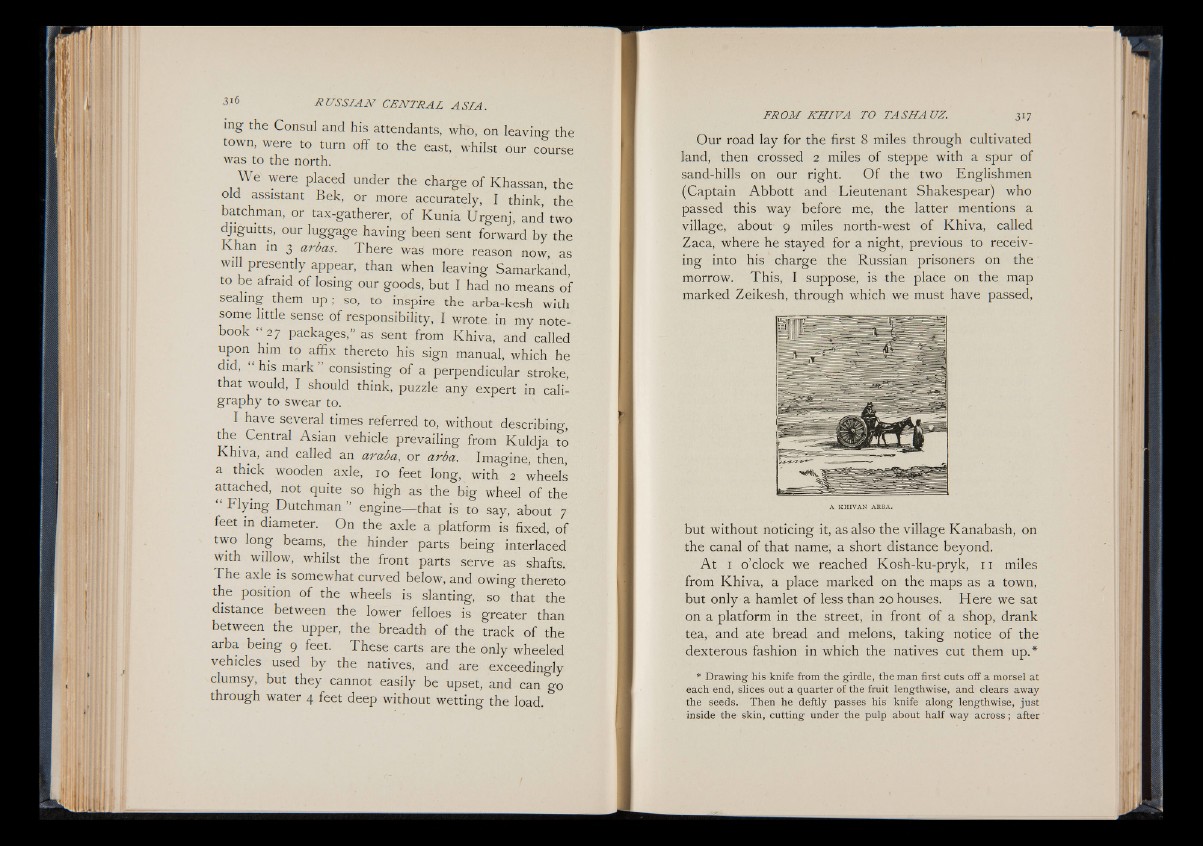
mg the Consul and his attendants, who, on leaving the
town, were to turn off to the east, whilst our course
was to the north.
We were placed under the charge o f Khassan, the
old assistant Bek, or more accurately, I think, the
batchman, or tax-gatherer, of Kunia Urgenj, and two
djiguitts, our luggage having been sent forward by the
Khan in 3 arbas. There was more reason now, as
will presently appear, than when leaving Samarkand,
to be afraid of losing our goods, but I had no means of
sealing them u p ; so, to inspire the arba-kesh with
some little sense of responsibility, I wrote in my notebook
“ 27 packages,” as sent from Khiva, and called
upon him to affix thereto his sign manual, which he
did, his mark consisting o f a perpendicular stroke,
that would, I should think, puzzle any expert in cali-
graphy to swear to.
I have several times referred to, without describing,
the Central Asian vehicle prevailing from Kuldja to
Khiva, and called an araba, or arba. Imagine, then,
a thick wooden axle, 10 feet long, with 2 wheels
attached, not quite so high as the big wheel o f the
“ Flying Dutchman ” engine— that is to say, about 7
feet in diameter. On the axle a platform is fixed, of
two long beams, the hinder parts being interlaced
with willow, whilst the front parts serve as shafts.
The axle is somewhat curved below, and owing thereto
the position of the wheels is slanting, so that the
distance between the lower felloes is greater than
between the upper, the breadth of the track of the
arba being 9 feet. These carts are the only wheeled
vehicles used by the natives, and are exceedingly
clumsy, but they cannot easily be upset, and can go
through water 4 feet deep without wetting the load.
Our road lay for the first 8 miles through cultivated
land, then crossed 2 miles of steppe with a spur of
sand-hills on our right. O f the two Englishmen
(Captain Abbott and Lieutenant Shakespear) who
passed this way before me, the latter mentions a
village, about 9 miles north-west of Khiva, called
Zaca, where he stayed for a night, previous to receiving
into his charge the Russian prisoners on the
morrow. This, I suppose, is the place on the map
marked Zeikesh, through which we must have passed,
A KH IV AN AR BA .
but without noticing it, as also the village Kanabash, on
the canal of that name, a short distance beyond.
A t 1 o’clock we reached Kosh-ku-pryk, 1 1 miles
from Khiva, a place marked on the maps as a town,
but only a hamlet of less than 20 houses. Here we sat
on a platform in the street, in front of a shop, drank
tea, and ate bread and melons, taking notice of the
dexterous fashion in which the natives cut them up.*
* Drawing his knife from the girdle, the man first cuts off a morsel at
each end, slices out a quarter of the fruit lengthwise, and clears away
the seeds. Then he deftly passes his knife along lengthwise, just
inside the skin, cutting under the pulp about half way across; after